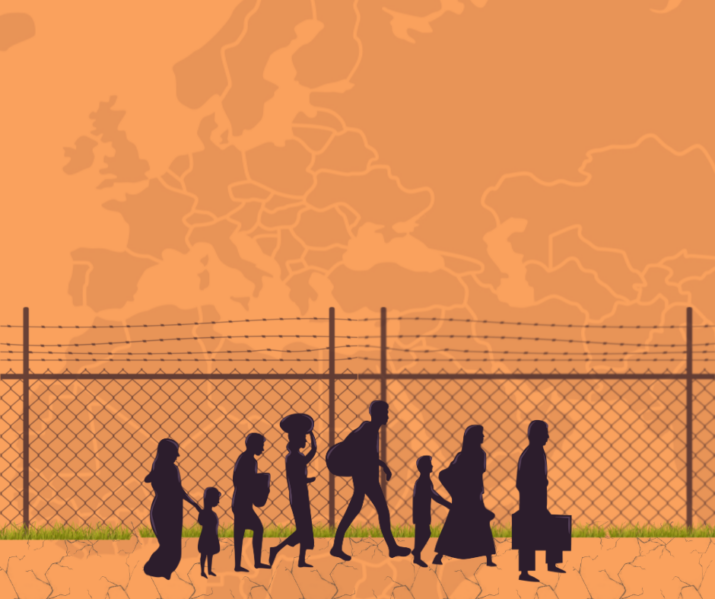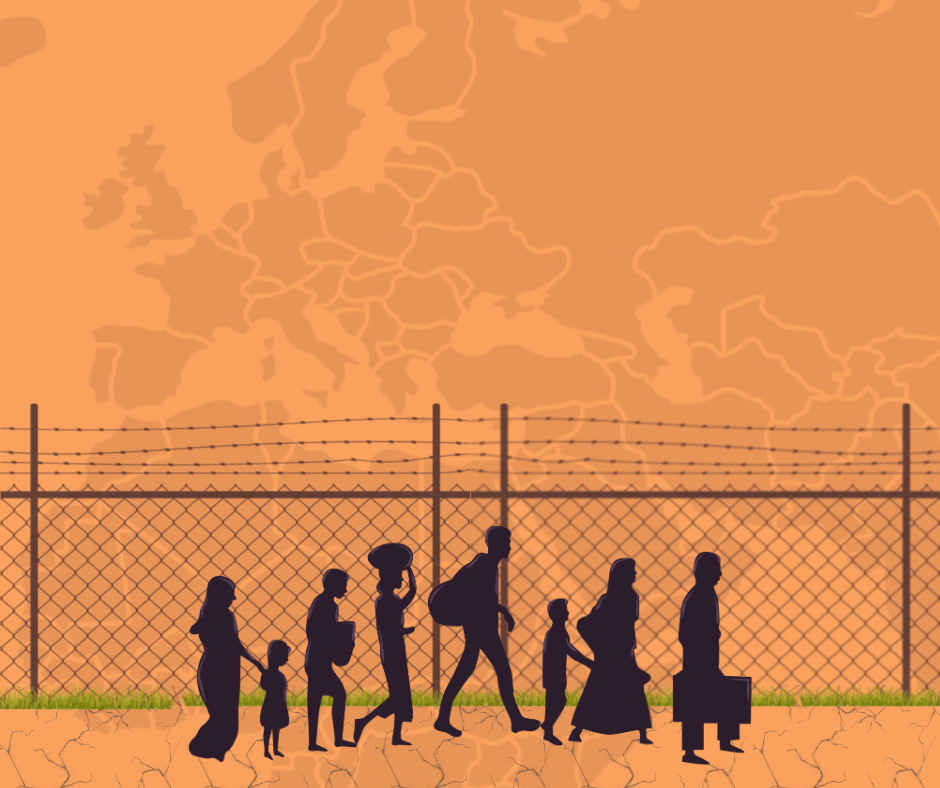
The EU’s Migration Dilemma: Balancing Diplomacy, Human Rights, and National Interests

By Gulsen Dogan
The United Nations estimates that nearly 281 million persons are categorized as international migrants worldwide, which constitutes 3.6 percent of the global population (IOM, 2024). The phenomenon of immigration represents a crucial issue that reflects a growing collective dissatisfaction across numerous nations, along with other insecurities. Immigration forms an integral aspect of a socio-cultural dialogue that necessitates a more thorough consideration of the existing political and economic contexts.
The European Union (EU) faces a complex migration conundrum, requiring a delicate equilibrium between diplomatic endeavors, human rights considerations, and national interests. This dilemma is exacerbated by the necessity to harmonize a range of frequently conflicting priorities among member states, while concurrently upholding international obligations and ensuring internal security. Consequently, the EU’s approach to migration involves navigating these tensions through policy frameworks and international agreements; nonetheless, it remains fraught with challenges and criticisms.
Diplomatic Challenges and the EU’s Strategy for Sustainable Solutions
The EU has framed the concept of “sustainable migration” as a political tool designed to foster consensus among the member states of the European Union. This concept has gained prominence particularly in the wake of the migration crisis that unfolded during the years 2015-2016. However, this concept lacks definitive legal obligations, which complicates effective implementation and allows national interests to dominate the discourse (Loxa, 2024).
Migration possesses the potential to induce significant economic consequences for the member states of the European Union (Tsourapas, 2021). While certain nations may reap benefits from the economic contributions of migrants, others may perceive migration as a burden on public services and resources. This economic dimension adds an additional layer of complexity to the European Union’s migration conundrum. Therefore, the EU’s migration policies critically challenge its dedication to human rights, particularly with respect to border security and the treatment of irregular migrants.
From a legal perspective, the Global Compact for Migration (GCM) and the Global Compact on Refugees (GCR) represent international efforts directed at enhancing the rights of migrants. Although the EU has endorsed these frameworks, implementing them would necessitate significant modifications to the EU’s own asylum policies to ensure the safeguarding of migrants’ rights. However, the execution of these modifications remains notably inconsistent (Bast et al., 2024). Furthermore, the legal framework governing migration within the EU includes the “more favorable provision” (MFP) clause, which allows member states to implement protection standards that surpass those required by EU legislation. This clause illustrates the complexities involved in reconciling national discretion with EU-wide standards, thereby highlighting the challenges associated with harmonizing migration policies across the union (Romano, 2024). The digitalization of migration processes, encompassing data collection and processing, introduces additional intricacies in balancing transparency with privacy rights (Autio, 2024).
Member states maintain distinct national interests and priorities concerning migration. These interests may encompass economic considerations, including labor demands, as well as security concerns related to border management and the deterrence of unauthorized immigration. The EU is required to develop a framework that reconciles these disparate interests while maintaining a cohesive migration policy. For instance, Greece’s migration policy, which integrates measures such as pushbacks and border fortifications, raises significant human rights concerns. Such actions highlight the tension between national security imperatives and compliance with human rights legislation (Yanıkdağ, 2024).
Migration represents a profoundly politicized issue within the context of the EU characterized by often polarized public opinions. Political organizations and movements exploit migration as a tactical platform to attract support, consequently influencing both national and EU-wide policy frameworks (Leonardelli & Tonelli, 2024). Therefore, achieving a consensus that reconciles the interests of all member states poses a formidable challenge for the EU. The EU‘s response to the migration crisis has encountered considerable criticism for being ad hoc and predominantly prioritizing border security over the protection of migrant rights (Robinson et al., 2024). This response is further complicated by the rise of nationalist political parties within numerous EU member states, which significantly influences the political landscape and informs policy-making processes. The issue of immigration has emerged as a critical concern within the realm of European political discourse, primarily attributed to the rise of far-right political entities (Mudde and Greilinger, 2024). This situation places substantial pressure on national administrations to develop and implement more stringent immigration regulations and border enforcement measures, as exemplified by Germany’s response to the electoral successes of the Alternative for Germany (AfD). As a result, this dynamic has the potential to create a more fragmented EU, wherein individual member states may pursue divergent policies regarding immigration and integration.
Migration Diplomacy and the EU Pact on Migration and Asylum
The EU regularly engages in migration diplomacy, which involves the strategic application of migration policies as tools within the domain of international relations. This diplomatic endeavor is encapsulated in the EU Pact on Migration and Asylum, which aims to address the complexities of migration governance through enhanced cooperation and regulatory frameworks. The European Union is compelled to proficiently navigate its relationships with countries that function as both origin and transit locations for migrants. The EU’s migration policy is profoundly influenced by the necessity to maintain diplomatic relations with neighboring regions, particularly Africa and the Middle East.
The EU employs a “carrot-and-stick” approach, leveraging financial aid and developmental programs to influence migration policies. This procedure includes the establishment of agreements that facilitate the regulation of migration flows, such as readmission treaties and developmental collaborations. Diplomatic efforts are intended to address the root causes of migration, including economic hardship and conflict, while simultaneously ensuring cooperative endeavors in border management and migrant repatriation (Deliversky, 2024). This strategic framework aspires to regulate migration trends and enhance security; however, it often results in tensions with countries that have differing priorities, such as the promotion of legal migration and the facilitation of remittance transfers (Akpomera, 2024). The ramifications of this agenda are multifaceted, impacting border governance, international relations, and the socio-political landscape within Europe. For instance, migration diplomacy involves negotiations with nations like Turkey, where migration-related issues are intertwined with broader diplomatic goals, including discussions on EU accession and the preservation of regional stability (Tsourapas, 2021). The interactions between the African Union and the European Union are similarly influenced by migration governance strategies, which are intricately linked to historical, socio-economic, and political contexts (Bugre, 2024). The agenda employs migration statecraft, strategically navigating power dynamics and conceptual frameworks to foster collaboration with third-party countries (Tamas, 2024). Despite the initiatives aimed at improving migration governance, challenges such as the underreporting of migration statistics continue to persist. This situation complicates the accurate assessment of migration patterns and the effectiveness of policy interventions (Dańko et al., 2024). Countries in North Africa are expected to oppose European migration policies, highlighting the geopolitical tensions that may emerge as a result of the EU’s migration agenda (Oxford Analytica, 2024).
Consequently, both bilateral and multilateral treaties function as pivotal mechanisms in the realm of migration diplomacy, facilitating the externalization of national borders and the reciprocal issuance of visas for skilled migrants in exchange for the repatriation of undocumented persons (Wenden, 2023). However, the migration accords formulated by the European Union, while adeptly addressing immediate exigencies, may inadvertently generate novel challenges, such as reliance on non-EU countries for migration governance and potential violations of human rights (Oxford Analytica, 2023). Critiques of migration diplomacy highlight its Eurocentric framework and the prioritization of state interests over humanitarian considerations. There exists an urgent necessity for more inclusive methodologies that acknowledge historical contexts and existing power disparities (Tolay, 2022).
On the other hand, the European Union’s strategy concerning migration involves complex interactions with member states, external nations, and a diverse array of stakeholders, thus influencing its internal cohesion and external diplomatic engagements. This sophisticated form of diplomacy is critical for addressing labor market demands, managing demographic shifts, and ensuring geopolitical stability (Bulyk, 2024). Furthermore, migration diplomacy within the EU necessitates the careful balancing of economic recovery objectives in the aftermath of the COVID-19 pandemic alongside the challenges introduced by an increasingly aging population. This scenario has prompted the strategic utilization of irregular migrant laborers to fill labor shortages, thereby accentuating the urgency for diplomatic endeavors with partner nations (Kokurin, 2023).
Conclusion
From a more comprehensive perspective, the migration framework of the European Union encapsulates a complex interplay among national priorities, international relations, and socio-political dynamics. Although the framework is constructed to enhance migration governance and foster collaborative initiatives, it simultaneously confronts significant challenges, such as geopolitical tensions and concerns regarding public perception. The effectiveness of the framework relies on the EU’s ability to reconcile these factors and to implement effective and equitable migration policies. Despite the EU’s efforts to uphold human rights and nurture diplomatic relations, the predominance of national interests often takes precedence, resulting in inconsistencies in policy implementation.
The European Union’s ‘People, Skills, Preparedness’ initiative currently represents a paradigm shift in social policy that may yield indirect consequences for migration diplomacy (Crespy and Kenn, 2024). By emphasizing skills and preparedness, this initiative has the capacity to influence the EU’s approach to migration, particularly in relation to the integration of migrants into the labor market through skill development programs. It may impact migration diplomacy by framing migrants as individuals with unique skills and needs, rather than as parts of broader social groups. Such a shift could lead to the formulation of policies that focus on managing migration flows as external disruptions, rather than addressing the root causes of migration or fostering sustainable integration.
The newly constituted commission is primarily focused on the protection of European Union democracy from external threats and the enhancement of international relations through initiatives such as the Global Gateway (Youngs and Panchulidze, 2024). This focus may unintentionally shape migration policies, especially concerning partnerships with non-democratic states, which could, in turn, affect migration trajectories. The commission’s strategic framework entails a shift from external to internal democracy policies, which may influence migration governance within the European Union. Given that numerous member states are facing fiscal constraints, there may be a shortage of resources dedicated to addressing migration issues. The emphasis on defense, security, and industrial sovereignty could overshadow migration concerns, potentially leading to a reduction in independent funding for migration-related programs.
Author Bio:
Gülşen Doğan is a Political Science Researcher and PhD Candidate in Political Science and International Relations at Koç University. Her research focuses on populism, democracy, multi-level governance, disaster diplomacy, and migration diplomacy, with a comparative emphasis on Türkiye, Hungary, and Brazil. As part of the Horizon Europe Twinning project BROAD-ER (Bridging the Migration and Urban Studies Nexus), she collaborates with international teams from Pompeu Fabra University and the University of Amsterdam to explore the intersection of migration and urban studies.
Her academic work—spanning research, teaching, and publishing—examines the dynamics of right-wing populism, multilevel governance, and policy innovation. She aims to contribute actionable insights to both academic and policymaking communities, promoting interdisciplinary dialogue on pressing global challenges.
Gülşen holds a B.A. in Political Science and International Relations & Sociology (double major, high honors) from Boğaziçi University and an M.A. in International Relations from Koç University, where she focused on the institutional and ideological drivers of executive aggrandizement in Türkiye and Brazil.
Currently, she is conducting her doctoral dissertation, which comparatively analyzes how Türkiye and Hungary employ migration diplomacy in their relations with the European Union, and how these strategies are instrumentalized to consolidate and legitimize right-wing populist governance.
In addition to her doctoral research, Gülşen serves as a project researcher at MiReKoç (Migration Research Center at Koç University) within the BROAD-ER project framework. Her broader research interests include populism, authoritarianism, democracy, governance, and regional migration regimes in the Global South and Europe.
Throughout her academic career, she has actively engaged with think tanks and research initiatives. During her undergraduate years, she served as Director of the Center for European Studies Student Forum at Boğaziçi University, organizing events and publishing on EU politics. In 2022, she worked as a research assistant for the Türkiye Program at the Washington-based Middle East Institute (MEI). From 2020 to 2023, she was a researcher and editor for the Democratization and Development Programs at the Istanbul Political Research Institute (IstanPol).
Published on July 8, 2025.




